Science: Groping in the Dark
Chapter Two
Astronomy was among the first of the sciences to be developed in the West. The early civilizations of Egypt and Mesopotamia made a diligent and careful study of the heavens. The people were essentially practical, so their investigations were centered around the problems of everyday life. They saw in the sun, moon and stars the manifestation of the gods who influenced every aspect of their lives. What would the weather be like for the harvest? When would the river flood? What would be the sex of the next child? Consequently, their understanding became mixed with deep superstition.
The ancient Greeks were the first people to approach scientific inquiry with a desire to learn for learning’s sake. Theirs was a remarkable civilization — considered one of the most productive learning periods in history.
The Greeks strove for perfection in mind and body, and saw evidence of it in the harmony of nature and the symmetry of the heavens. They were intensely curious about everything around them. They plotted the courses of the stars and planets. They collected fossils. They sorted birds and beetles into categories. They studied anatomy, art and architecture. They developed innovative theories of politics and government.
The most scholarly and systematic of the Greek philosophers was Aristotle (384-322 B.C.). He organized and classified vast amounts of information about the world of his time. Many of his concepts in the areas of astronomy, anatomy and physics greatly influenced scientific thought for centuries.
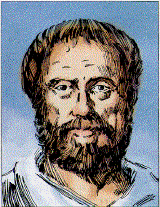 |
| “All men by nature desire to know” — Aristostle (384-322 B.C.) portraits by Ken Tunell |
| 500 B.C. |
|
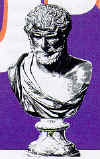 Democritus Democritus |
|
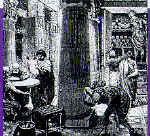 Library of Alexandria |
|
| A.D. 740 |
|
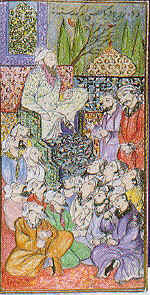 Arab classroom Arab classroom |
This was a mixed blessing. Because he relied solely on observation and reason, Aristotle had remarkable insight in some areas. But in other areas he was at best inadequate and, at worst, hopelessly wrong.
Reason and observation are effective if one argues from a true premise. If the basis of an argument is false, anything deduced from it may also be false. It is like typing with your fingers not properly placed over the home keys. As any typist knows, the home keys are where you place your fingers before you start. With your fingers properly oriented, you can type quickly and accurately. If you don’t start on the home keys, the result will be confusion.
The Greek philosophers, when they based their arguments on incorrect assumptions, made some now obvious mistakes. In Aristotle’s case, he reasoned that the earth was the center of the universe, and that the sun and planets went around it. His earth-centered theory of the universe, further developed by the astronomer Ptolemy in the second century A.D., was the standard explanation until modern scientific methods proved their superiority. Aristotle’s methods and conclusions were accepted until the 16th century.
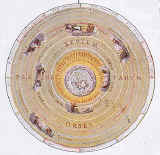 |
| Earth-centered theory of the universe |
By the time the Greek civilization became dominated by the Romans, the Greeks had made a useful start on the systematic compilation of knowledge. They had asked a significant number of the right questions and diligently pursued the answers. Their great libraries became vast storehouses of information. In its heyday, the library at Alexandria may have held nearly half a million documents. Unfortunately, Greek civilization declined, and their treasure houses of information were eventually destroyed. The Romans, like the Egyptians and Babylonians, were an essentially practical people. Brilliant architects, builders and engineers, they were mainly concerned with putting knowledge to work.
The Romans built roads, bridges, aqueducts and amphitheaters, some still in use today, but they did little to advance the course of theoretical science.
The Lights Go Down
After the Roman Empire fell in the fifth century A.D., scientific progress virtually came to a standstill in the West. Christianity, by this time the state religion of the Roman Empire, focused on the afterlife more than on this life. The church began to view as a threat scientific discovery and anything else that challenged the established order.
But as the lights dimmed in the realm of Christendom, they went on in the Arab world. If the early Middle Ages were the Dark Ages in Europe, they became the golden age of Islamic science. The Arab peoples, unified in faith and language, continued to develop science. They preserved Greek learning and carefully translated works that might otherwise have been lost.
As their influence and their empire expanded, Islamic scholars had the opportunity to compare the learning of both East and West. From India, they learned the use of the zero in calculation. They also further developed a new numbering system that was much simpler than the cumbersome Roman method of assigning a numerical value to various letters of the alphabet.
In the eighth century, the Arabs learned from Chinese captives the technique of papermaking. With a steady supply of paper, books became more common. In the 10th century the great library at Cordoba, in Islamic Spain, probably had around half a million volumes. At that time there were probably no more than several thousand books in all the rest of Europe.
But the tide of history ebbs and flows. In the 12th century, knowledge of the Greek philosophers eventually began to filter slowly back into Europe, and with it came a reawakening of scientific curiosity.
Science began a difficult and painful rebirth. Difficult and painful because the church had become the supreme authority and was still suspicious of the influx of knowledge that challenged its traditional position.
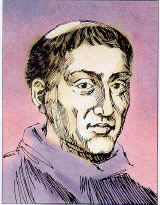 |
| Thomas Aquinas (A.D. 1225-1274) |
Thomas Aquinas (1225-1274), the leading scholar of medieval theology, considered human reason an adequate instrument for attaining truth about the physical world. Thus, he generally accepted Aristotle’s ideas of physical phenomena as a foundation for physical science. If God could be known through his creation, that creation could be known by Aristotle. If Aristotle had reasoned that the earth was the center of the universe, that would also be the church’s official view. Scientific discovery that conflicted with Aristotle was suppressed.
Medieval theologians regarded salvation as the very reason why the earth and the heavens existed. So obviously, the earth was the center of the universe and the physical focus of God’s creation.
Any other concept of the universe did not sit well at all with the church. Did this not diminish the central role of Christ and his sacrifice, and thus strike deep at the foundations of the Christian faith? It was dangerous thinking that the church did its best to squelch.
Today, this resistance to scientific progress seems stubborn, short-sighted and foolish. But if viewed in the context of the times, it is easier to see the church’s point of view. Church authorities thought they were preserving truth, not suppressing it.
In many ways, the 15th century was not any more advanced than the fifth. Most work was done by hand, during daylight hours. Machinery was rudimentary and inefficient. If people traveled — and most never did — they were limited to the speed of a galloping horse, while their goods followed behind at the rate of a plodding ox.
Sailors cautiously edged their ships along the coasts, trying not to lose sight of land. A few brave mariners groped their way across the oceans at the mercy of the wind and the currents, trusting their imperfect knowledge of the stars and their crude instruments.

